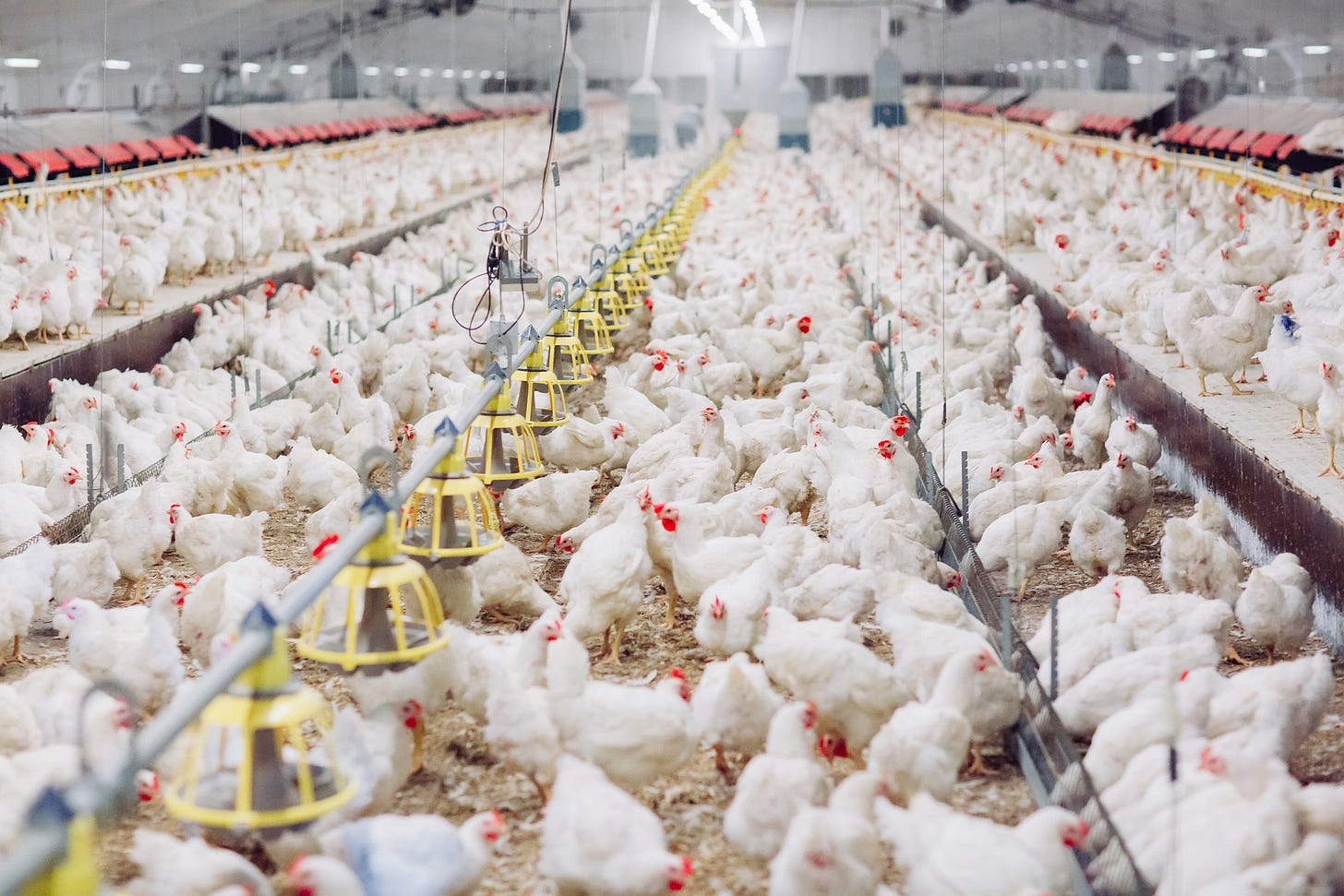In recent years, consumer demand for ethically sourced products has skyrocketed. This has led many to choose "cage-free" eggs over conventional ones, picturing chickens roaming freely in pastures under a bright sky. However, the reality behind this label may not be what you expect.
‘‘‘Cage-free’’ eggs: A misnomer for many. While hens aren't in cages, vast barns replace them, housing thousands. Crowded conditions lead to stress, disease susceptibility, and deprived natural behaviors, questioning the label's welfare claims.’’
This article dives right into the ethical concerns surrounding "cage-free" egg production, shedding light on the implications for consumers, producers, and the chickens themselves.
The Myth of "Cage-Free" Bliss:
While "cage-free" technically means chickens aren't confined in the restrictive cages typical of conventional egg farming, it doesn't guarantee the idyllic image many envision. In reality, many "cage-free" facilities house hens in large, warehouse-like barns with limited or no access to the outdoors. These barns can hold tens of thousands of birds, creating a crowded and stressful environment. This crowding can lead to feather pecking, cannibalism, and a weakened immune system, making the chickens more susceptible to diseases like avian influenza [1].
Furthermore, the lack of access to natural sunlight and fresh air can have a detrimental impact on the chickens' physical and mental well-being. Confined to these barns, they are unable to exhibit natural behaviors like dust bathing, scratching the ground, and building nests. This lack of enrichment can lead to boredom, frustration, and even bone deformities [2].
Investigation Findings:
Recent investigations by animal rights organizations and independent journalists have exposed concerning practices within the "cage-free" egg industry:
Overcrowded Barns: An undercover investigation by the Humane Society of the United States (HSUS) documented overcrowding in "cage-free" facilities, with hens having less than one square foot of usable space per bird [3]. This is only slightly more space than they would have in a cage. You can find the report here: HSUS Cage-Free vs Battery Cage Eggs: https://www.humanesociety.org/resources/cage-free-vs-battery-cage-eggs.
Insufficient Access to Food and Water: Due to the high number of birds and inadequate feeder and waterer systems, some chickens may not get enough to eat or drink, leading to malnutrition and dehydration.
Inadequate Veterinary Care: Large flock sizes and limited veterinary care can mean that sick or injured birds may not receive proper treatment, suffering unnecessarily.
Poor Ventilation and High Ammonia Levels: The buildup of ammonia from manure in poorly ventilated barns can cause respiratory problems in chickens, further compromising their health.
These findings suggest that the welfare of chickens in "cage-free" systems might not be significantly better than that of caged hens.
Consumer Misconceptions and Labeling Loopholes:
The appeal of "cage-free" eggs stems from misconceptions about the label. Many consumers believe they're making an ethical choice, unaware that the industry standards for "cage-free" may not meet their expectations.
Furthermore, the lack of clear, federally mandated regulations for "cage-free" allows producers significant leeway in interpreting and implementing these practices. This vagueness benefits the industry at the expense of both consumers and the chickens.
The Path Forward:
Addressing this issue requires a multi-pronged approach:
Stricter Regulations and Labeling: Clear, regulated standards for "cage-free" that accurately reflect the chickens' living conditions are essential. Consumers deserve to know exactly what they're buying.
Educated Consumers: By understanding the realities of egg production, consumers can drive change by supporting ethical practices. Look for certifications from organizations like the American Humane Certified Cage-Free program, which sets stricter animal welfare standards than the USDA requirements. Consider exploring alternatives like plant-based egg substitutes.
Technological Advancements: New technologies offer the promise of more humane and sustainable egg production methods. For example, companies are developing innovative cage-free housing systems that provide hens with more space, natural light, and enrichment opportunities.
Conclusion:
The "cage-free" label is a complex issue. As consumers, we deserve transparency. Only through informed choices, stricter regulations, and ethical farming practices can we achieve the vision of truly humane egg production.
Call to Action:
Educate yourself about egg production practices. Look for certifications from organizations that prioritize animal welfare. Consider exploring plant-based alternatives.
Sources:
The Humane Society of the United States (HSUS): HSUS Cage-Free vs Battery Cage Eggs: https://www.humanesociety.org/resources/cage-free-vs-battery-cage-eggs - Provides comprehensive reports and research on animal welfare practices.
Animal Welfare Institute (AWI): https://awionline.org/
- Conducts research and offers analysis of animal welfare issues in farming
Visit Our Amazon Store!
All sales of our Vegan Products help promote animal rights worldwide!
General Resources
Books:
Dominion: The Power of Animals in Nature and in Our Imagination by Matthew Scully
Animal Liberation by Peter Singer
Eating Animals by Jonathan Safran Foer
A Billion Hungry Mouths: Feeding the World Without Consuming the Planet by Colin Tudge
Websites and organizations:
Documentaries:
Articles:
"The Case for Animal Rights" by Tom Regan
‘‘Why We Love Dogs, Eat Pigs, and Wear Cows: An Introduction to Carnism’’ by Melanie Joy
‘‘Animal Rights: The Abolitionist Approach’’ by Gary L. Francione
‘‘Fellow Creatures: Our Obligations to the Other Animals’’ by Christine Korsgaard
Seeds of Compassion: Finding Jesus Christ in a Vegan World by Michael Corthell
Receive a single informative article daily at 12:01 AM by email. Explore my homepage with exciting vegan and plant-based news content and delightful and delicious recipes for additional updates. Stay connected to the vegan world and all it has to offer.
Visit The Vegan Project Global our Facebook page for more vegan outreach and education.
Also, visit our new YouTube channel
The information on this vegan/plant-based blog is for general informational purposes only. It is not intended as legal, medical, or professional advice. Readers should consult with appropriate professionals for specific advice tailored to their situation. The blog owner is not responsible for any reliance on the information herein.





